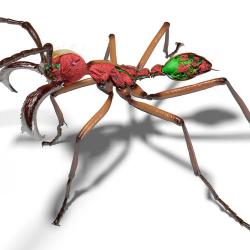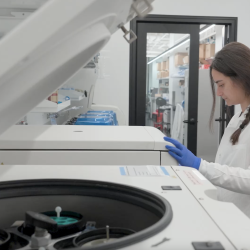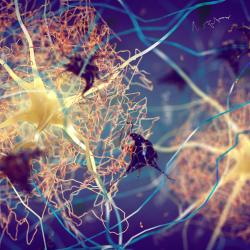Computer Science Senior Louis-Henri Merino Named Fulbright Scholar
Merino will conduct research in Switzerland, where he hopes to contribute to the development of a blockchain-based electronic voting system
University of Maryland computer science senior and Banneker/Key Scholar Louis-Henri Merino has received a Fulbright U.S. Student Grant to conduct research in Lausanne, Switzerland. Merino will collaborate with researchers at the École Polytechnique Fédérale de Lausanne (EPFL) on a secure electronic voting system that can resist attacks from hackers.
 “Elections are the lifeblood of a democratic society and I want to contribute to creating secure electronic voting systems,” said Merino, who is a member of the Advanced Cybersecurity Experience for Students (ACES) program in the Honors College. “My hope is that one day, with such technology, we will be able to vote directly on our phones.”
“Elections are the lifeblood of a democratic society and I want to contribute to creating secure electronic voting systems,” said Merino, who is a member of the Advanced Cybersecurity Experience for Students (ACES) program in the Honors College. “My hope is that one day, with such technology, we will be able to vote directly on our phones.”
During his year in Lausanne, Merino will work with Bryan Ford, an associate professor of computer and communications sciences at EPFL.
Ford’s group developed a prototype blockchain-based voting system. A blockchain is a system of computers that all have copies of the same database. These computers constantly check with each other to make sure that their copies of the database are the same. Attackers who want to tamper with Ford’s system must simultaneously attack 66% of the computers in the blockchain, not just one. This makes blockchains much more secure than many other ways of storing data.
Merino will work to adapt Ford’s prototype system to the requirements of voting systems used in Switzerland. In addition, he hopes to write code that gives voters the ability to verify that they cast their votes as intended, while keeping their own identity private.
“Switzerland wants two-thirds of its 26 cantons to use electronic voting by the end of 2019, so it is an ideal place to study how to secure electronic voting systems,” Merino said.
Merino began to work in research while he was a high school student at the Manhattan Center for Science and Mathematics in New York City. During the summer of 2014, he interned at the National Institutes of Health (NIH) with scientists Bhaskar Dutta (M.S. ’04, Ph.D. ’07, chemical engineering) and Iain Fraser. Merino helped to ensure the security of a website that can compare results from multiple experiments stored on different computers. In 2016, he co-authored a research paper about this work that was published in the journal Nature Communications.
In fall 2014, when Merino began to apply to colleges, Dutta suggested that Merino consider UMD. Merino researched UMD and decided to apply when he found that he could study cybersecurity in the ACES program while continuing to conduct research at NIH.
In his sophomore year at UMD, Merino also began to conduct cybersecurity research with ACES Director Michel Cukier, an associate professor in the University of Maryland Institute for Advanced Computer Studies and the Department of Mechanical Engineering. Working with Cukier at the Maryland Cybersecurity Center, Merino used applications known as “honeypots,” which purposefully attract hackers, to analyze hackers’ behaviors.
When he finishes his Fulbright year, Merino will return to UMD to start a Ph.D. in reliability engineering with Cukier as his advisor. Merino hopes to continue studying blockchain technologies and other decentralized applications that are spread over many computers.
“I’m interested in decentralized applications because they don’t have a single point of control,” Merino said. “The lack of central control in these applications encourages diverse sets of users to debate about the future of the applications.”
###
The research paper, “An interactive web-based application for Comprehensive Analysis of RNAi-screen Data,” Bhaskar Dutta, Alaleh Azhir, Louis-Henri Merino, Yongjian Guo, Swetha Revanur, Piyush Madhamshettiwar, Ronald Germain, Jennifer Smith, Kaylene Simpson, Scott Martin, Eugen Beuhler and Iain Fraser, was published in the journal Nature Communications on February 23, 2016.
This work was supported by the National Institute of Allergy and Infectious Diseases; the National Center for Advancing Translational Sciences; Harvard Medical School; the Australian Cancer Research Foundation; the Victorian Department of Industry, Innovation and Regional Development; the Australian Phenomics Network; the Australian Government’s Education Investment Fund; the Australasian Genomics Technologies Association; the Brockhoff Foundation and the Peter MacCallum Cancer Centre Foundation. The content of this article does not necessarily reflect the views of these organizations.
Media Relations Contact: Irene Ying, 301-405-5204, zying@umd.edu
University of Maryland
College of Computer, Mathematical, and Natural Sciences
2300 Symons Hall
College Park, MD 20742
www.cmns.umd.edu
@UMDscience
About the College of Computer, Mathematical, and Natural Sciences
The College of Computer, Mathematical, and Natural Sciences at the University of Maryland educates more than 9,000 future scientific leaders in its undergraduate and graduate programs each year. The college’s 10 departments and more than a dozen interdisciplinary research centers foster scientific discovery with annual sponsored research funding exceeding $175 million.






